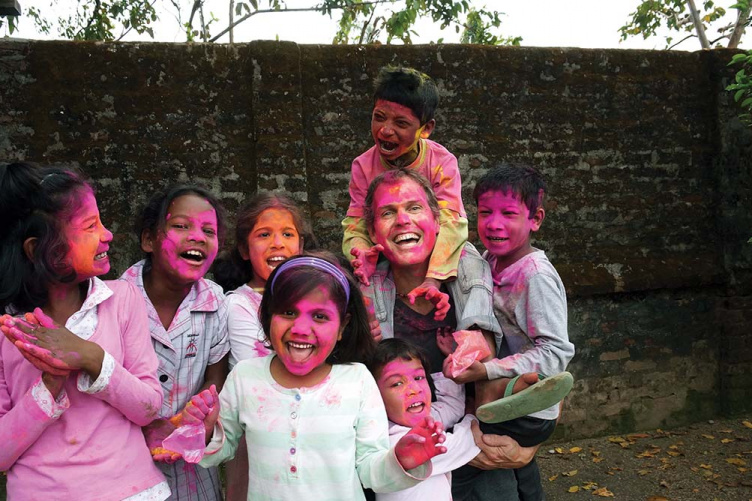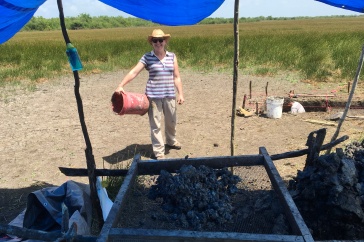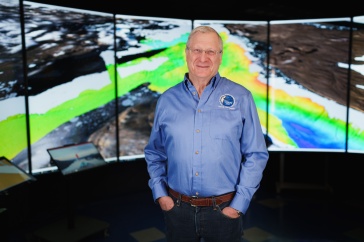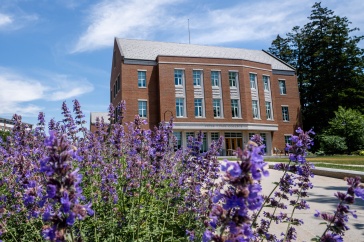
Also read a Q&A with John Marshall '87
I am surrounded by children, all wanting to be seen. “Pick me up, Uncle,” they clamor, but my arms are full. My heart is full, too. I know these kids by name, the once foreign sounds now familiar and beautiful to me: Jimika, Santoshi, Sawbitri. And I know their heartbreaking stories, the tales of abandonment and loss that all orphans carry with them.
So why do these children pulse with a joy that is so infectious, pouring their love into me day after day as if I am the one who is empty? And how did I get here, in the middle of their remarkable lives in an unremarkable corner of a jungle in India?
Looking back on the road I’ve traveled since college, I can see how my life has been shaped by a series of impractical choices, times I’ve chosen heart over head, passion over profit. My college-age son describes it more simply: “You held on to your dreams,” he says proudly. And for me, as Frost once wrote, that has made all the difference.
 I studied business administration at UNH, hoping it would help me make some money — but I felt no passion for the work. To me, statistics were cruel and unusual punishment and lectures on monetary policy were dry as dust. By senior year, I was daydreaming of something different, something fun: I wanted to write movies. Never mind that I had no contacts in the film business or that I had never read an actual screenplay. The idea of Hollywood filled me with excitement, and I decided to follow that feeling and see where it would lead.
I studied business administration at UNH, hoping it would help me make some money — but I felt no passion for the work. To me, statistics were cruel and unusual punishment and lectures on monetary policy were dry as dust. By senior year, I was daydreaming of something different, something fun: I wanted to write movies. Never mind that I had no contacts in the film business or that I had never read an actual screenplay. The idea of Hollywood filled me with excitement, and I decided to follow that feeling and see where it would lead.
After graduation, I moved to Los Angeles and embraced the writer’s life. It was not a series of premiere parties and awards ceremonies. Though I wrote with youthful optimism and had some minor successes, no one offered to produce the growing pile of screenplays I created. Still, I loved the process: the pen-to-paper discipline, the creative exploration. I just needed to find a way to pay the bills.
Five years later, newly married and a bit worn from rejection, my wife, Traca, and I decided to move back to New England and start a family. By the time our first child was about to arrive, with the financial pressures of parenthood closing in on me, I sat in our small Portland, Maine, apartment having a panic attack. I was working a lame job at a local restaurant, waiting tables so I could keep writing during the day, keep dreaming. But as Traca’s belly grew bigger, the voices of conventional wisdom grew louder.
It’s time to get serious. Grow up! How can you afford a baby if you can’t afford your own life? With these thoughts swirling, I decided to apply for an insurance job I saw advertised in the paper. It promised health coverage and a big potential salary. Maybe it wouldn’t be so bad, I told myself. Maybe I could put my business degree to use after all.
So I went to a cattle-call interview at a local hotel and gave them the answers I knew they wanted to hear. “What do you value more, money or family?” the stiff rep asked. I said money, which was a lie — but I got the job. “You start Monday!” the rep announced with an enthusiasm I did not share. We shook hands, and I walked out smiling. But inside I felt dead. I was giving up, selling out, trading my dreams and my heart for a little fear-based security.
That night at a Chinese restaurant, I talked about it with Traca, a fellow dreamer who totally understood. “You don’t have to take the job. We’ll figure it out,” she said, eight months pregnant. Then she handed me a fortune cookie and smiled.
“I’m going to let this cookie decide it,” I joked as I pulled out the thin slip of paper. I’ll never forget the words written inside:There is as much love in a small house as there is in a big one.
It wasn’t a burning bush, but this message was all the courage I needed. I read the words aloud, then stood up from the table. “I’m not taking the job!” I shouted, and I’m not kidding: We danced out of that restaurant as if we’d won some kind of life lottery.
From that moment on, I committed to a creative life, and I’ve never looked back.
After lots of hard work and many lean years, I became creative director at several Maine TV stations. I got to design logos, draw cartoons, write scripts, direct and produce TV shows, host on-air segments, even write theme songs and jingles when necessary. It was a dream job, and I loved every minute of it.
But one day, after nine Emmy awards, at the peak of my career, my pesky heart began to call me away again. I could not resist the lure of another impractical adventure.
In 2010, needing a break and wanting at last to fulfill a lifelong dream, Traca and I pulled our two teenage children out of school, quit our jobs and took a six-month trip around the world. We couldn’t afford the typical restaurant-hotel-museum kind of trip, so we volunteered our way from country to country. We worked with service organizations in remote areas on all kinds of interesting and challenging projects.
 We spent time at an animal sanctuary in the rainforest of Costa Rica, labored on organic farms in New Zealand, taught English in rural Thailand, fell in love with orphans in India and worked alongside a Buddhist monk high in the Himalayas. It was a chance to unplug, to reconnect with each other and the world, to be an intact family for a while longer before college started and we all drifted apart.
We spent time at an animal sanctuary in the rainforest of Costa Rica, labored on organic farms in New Zealand, taught English in rural Thailand, fell in love with orphans in India and worked alongside a Buddhist monk high in the Himalayas. It was a chance to unplug, to reconnect with each other and the world, to be an intact family for a while longer before college started and we all drifted apart.
A few friends thought we were being more than impractical this time. We were being reckless, even foolish, they said. They saw the world as full of potential dangers, diseases, terrorists. Why would we trade the security we’d worked so hard to establish for some fleeting family adventure? Because — well, here’s what I’ve come to believe: It’s often the impractical decisions, even the reckless desires we act upon, that wake us up, snap us out of routine, and create entirely new possibilities in our lives.
When the trip was over, I wrote our story as a memoir called Wide-Open World and sold it to Random House. Thrilled with the prospect of finally being a published author, I returned to work in television, only to find the office no longer fit me. At my desk, the world and all its need, all its freedom, whispered to me as I tried to concentrate.
Re-entry can be difficult. Some people report that their lives are forever altered by a single week of overseas service. After six months of volunteer travel, I was hungry to do more meaningful work.
In 2014, still waiting for my book to be released (it hit stores this past February), I left my job once more and went back to India, thinking I would volunteer my
way around the country for a while and write about it. But shortly after landing, while working at an elephant sanctuary in Jaipur, I became extremely sick. The fungal infection inside my skull was so rancid, I gagged at the odor coming out of my own nose.
Blinded by fever and desperate for a familiar face, I returned to the Good Shepherd Agricultural Mission, the orphanage my family and I had visited on our Wide-Open World tour. I was hoping to stay a few weeks and find a little comfort. I ended up staying for eight months and finding an entirely new direction for my life.
The children I met were a revelation, opening my eyes to the reality that orphans face all over the world. With 22 million orphans in India and an estimated 153 million orphans worldwide, my time at the Mission has made it impossible for me to live as if these children do not exist.
I now get to write full-time and dedicate most of my creative energy to helping orphaned and abandoned children. Through videos, songs and stories, I love to highlight the beauty of these forgotten kids, raise money for them, and do my part to lift them up. When I do this, when I make some small difference for even a single child, I feel as if all my training and all my seemingly impractical choices have been preparing me for this very purpose.
And so I stand in a dusty courtyard, watching the setting Indian sun, surrounded by smiling children, their voices blending into a single happy note. “Pick me up, Uncle,” they all shout. Kushboo, Malika, Jyotika. While they pull me and call me in a dozen insistent directions, my soul sings, my heart applauds and I know I’m right where I should be.

VOLUNTOURISM HOW-TO
Companies exist that will set up a volunteering trip for a fee. The Marshalls’ strategy for their around-the-world trip was simply to do an Internet search for the name of a country they wanted to visit, plus the word “volunteer” — “volunteer Costa Rica,” for example.
From the results, they chose what looked interesting and contacted the organizations directly. Smaller projects tended to be more responsive, they found.
Most organizations do charge volunteers for room and board. In 2010, when the Marshalls had a budget of $1,000 a month (not including airfare) for the four of them, they found some groups were willing to negotiate down from their usual fee. They set up a few stops from home and arranged the rest as they went along.
More details are in the epilogue to John Marshall’s book, Wide-Open World. Here’s what John, Traca, Logan and Jackson Marshall wound up doing during their six-month trip:
• Worked with animals at the Osa Wildlife Sanctuary in Costa Rica, where monkeys roam free and humans essentially live in cages.
• Through WWOOF— Willing Workers on Organic Farms — worked three to five hours a day, in exchange for free room and board, at three farms in New Zealand.
• Taught English in rural central Thailand through the organization Volunthai.
• Volunteered at Good Shepherd Agricultural Mission, a Christian orphanage in India to which John has since returned several times.
• Helped out at the Siddhartha School in Ladakh, in the Himalayan region of India near Tibet.
John Marshall ’87, is a nine-time Emmy Award-winning television writer and producer and the founder of New Orphanage, a nonprofit that seeks to find and support the best orphan projects worldwide. His memoir, Wide-Open World: How Volunteering Around the Globe Changed One Family’s Lives Forever, is available from Ballantine Books / Random House. To contact John, visit www.johnmarshall.com
Originally published in UNH Magazine—Spring/Summer 2015 Issue
-
Written By:
John Marshall '87 | Communications and Public Affairs

















































